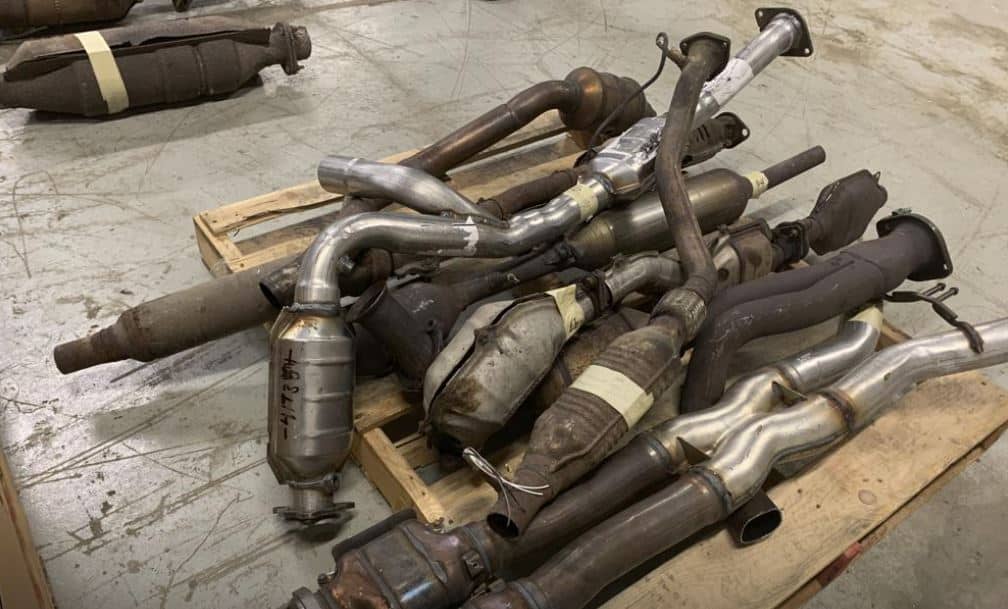Catalytic Converter Thefts on the Rise as Supply Chain Woes Continue

SAN ANTONIO — State legislators across the country have taken action to curb the rampant increase in catalytic converter thefts propelled by pandemic-induced supply chain problems.
The dramatic rise in catalytic converter thefts has been tracked closely by auto insurance agencies nationwide throughout the pandemic, with State Farm reporting a near-293% increase compared to the previous year from mid-2020 through the first half of 2021.
Catalytic converters are components of the exhaust systems of vehicles with gasoline or diesel-powered internal combustion engines that convert fumes from exhaust gas into less-harmful pollutants by catalyzing a type of chemical reaction.
“As we continue to endure the COVID-19 pandemic, we are seeing a steep increase in the number of auto parts thefts around the country, particularly of catalytic converters,” Michael Keating, State Farm vice president of operations, said in a written statement.
State Farm paid out a little more than $12 million in claims for catalytic converter thefts in the last half of 2020 but paid more than $21 million in catalytic converter theft claims in the first half of this year. Although vehicles can still function without the emissions-cutting components, federal regulations require them to pass inspection and meet registration requirements.
Catalytic converters take only minutes to remove, even with basic tools. Thieves sell the converters for hundreds of dollars on internet marketplaces or at scrapyards, leaving victims to spend thousands of dollars to have the parts replaced.
Automakers in the U.S. have been required to include catalytic converters as exhaust components since the Environmental Protection Agency tightened its emissions regulations beginning with the 1976 model year, according to the National Law Review.
California was the leading state in catalytic converter theft claims in 2021, followed by Texas, Minnesota, Washington and Illinois, according to State Farm auto claims data.
“Vehicle thefts, carjackings, and break-ins are all crimes we’ve witnessed trending upward for several months, and now catalytic converter thefts are also on the rise,” David Glawe, president and CEO of the National Insurance Crime Bureau, said in a written statement. “We have seen a significant increase during the pandemic. It’s an opportunistic crime. As the value of the precious metals contained within the catalytic converters continues to increase, so do the number of thefts of these devices.”
Stifled global supply chains still impacted by global labor shortages have increased the value of the metals used in catalytic converters, NICB officials warned. The per-ounce prices of platinum, palladium, and rhodium have been driven up sharply due to supply chain scarcity and a clear connection exists “between times of crisis, limited resources, and disruption of the supply chain that drives investors towards these precious metals,” NICB officials said in a press release.
In response, at least 11 states enacted laws this year to address catalytic converter thefts with legislation pending in 10 other states as well, according to the National Conference of State Legislatures. For instance, Minnesota state legislators have instituted a pilot program for car owners to have their catalytic converters engraved with vehicle identification numbers in order to identify the parts if removed.
Further, Texas legislators passed a bill this year that makes buying or selling stolen catalytic converters a third-degree felony, and parts sellers are now required to provide proof of ownership to metal recycling centers in order to sell the devices. NICB issued a statement in support of the Texas bill prior to its enactment, in which Glawe asserts “[there] is a clear connection with times of crisis and limited police resources, which results in an increase in crimes of opportunity.”
In October, the Wisconsin State Senate passed a measure with unanimous approval that requires individuals selling catalytic converters to scrapyards to be at least 18 years old, show proof of ownership and present proper identification. Additionally, a measure goes into effect next year in Oregon that forbids scrap metal businesses from buying or receiving catalytic converters unless they are from commercial sellers or the vehicle’s owner.
The measure also includes the institution of new record-keeping requirements for the transactions.
To protect against theft, NICB recommends vehicle owners install aftermarket catalytic converter anti-theft devices, park fleet vehicles in enclosed and secured areas and lock personal vehicles inside of garages overnight. If vehicle owners lack garage space, NICB also recommends installing motion sensor security lights to discourage tampering.
“Removing a catalytic converter takes only minutes using some basic, readily-available, battery-operated tools from a local hardware store,” Glawe added in his caution to consumers. “And for the vehicle owner, it’s costly due to the loss of work, finding and paying for alternate transportation and then paying anywhere from $1,000 to $3,000 to get your vehicle fixed.”
Reece can be reached at [email protected]























